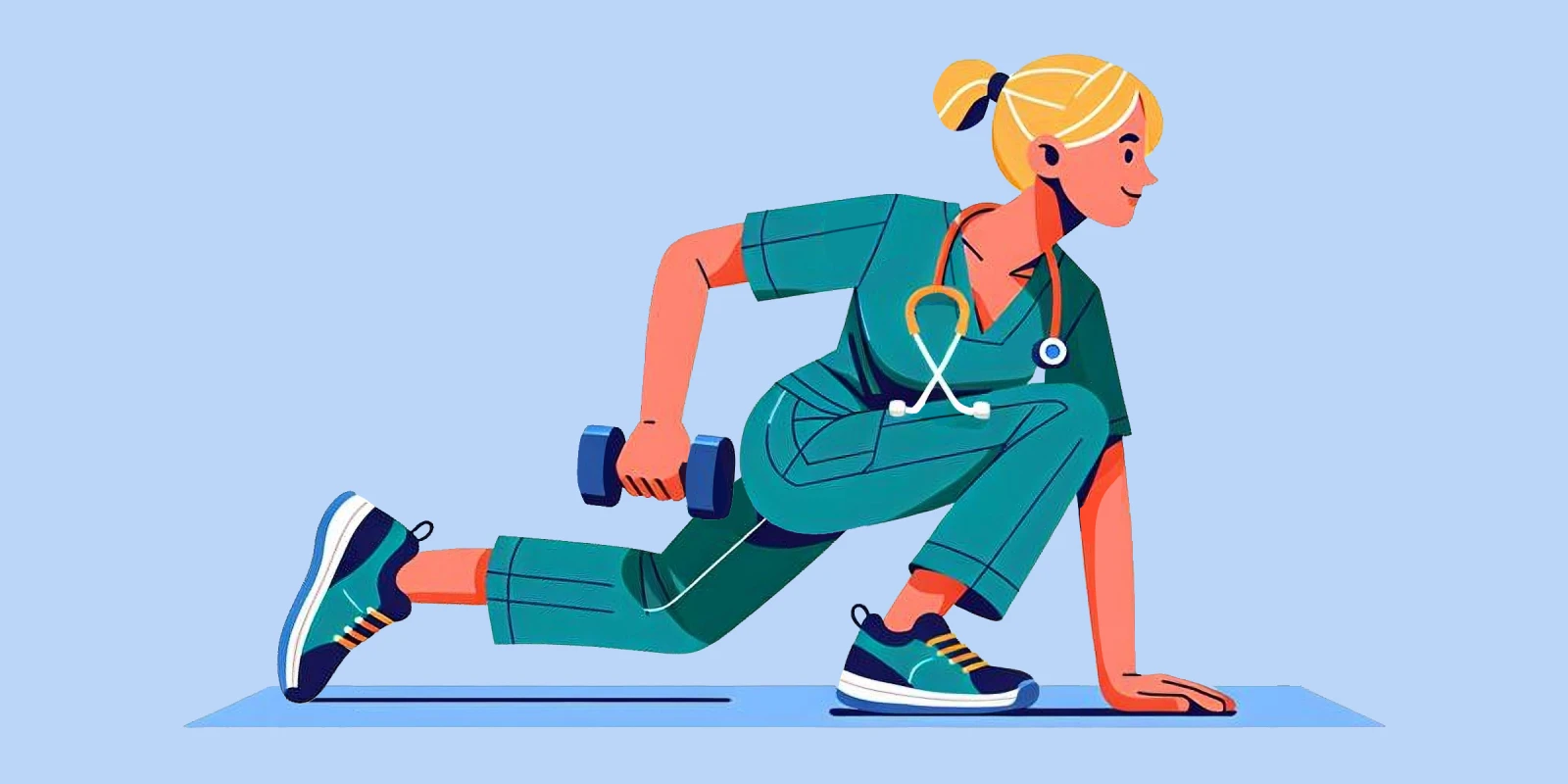As clinicians, we often counsel patients regarding their physical fitness, whether the recommendation is intended to decrease their risk of diabetes or increase their ability to withstand the stress of a long surgery. But what about our fitness?
As a fellow surgeon eloquently wrote, the practice of medicine takes a physical toll, particularly on those of us in procedural specialties where we spend hours on end standing, fasting, and contorting into awkward positions to see around a corner or throw a difficult stitch. A lot of work has been done on surgical ergonomics and emphasizing posture and stretching during surgeries, but these seem like hyper-focused fixes for what is not just a job, but a lifestyle.
Busy schedules, late hours, and high cortisol levels lead to poor nutritional choices, like grabbing whatever is easy and appealing in the hospital cafeteria. (As an aside, can we talk about the ubiquity of high sugar, high fat, low nutrition options in hospital cafeterias? For patients and employees alike, vegetables tend to be scarce and sodium high. My current favorite to grab at the end of the day — mango gummy rings coated in Tajin — contain two-thirds of the daily recommended amount of added sugar per small package. Yikes.) And then there’s the matter of sleep. Sleep is one of the first things to go for busy surgeons, and feeling tired is de rigueur. But being so tired that you don’t remember driving to the hospital once you get there is not good for anyone.
Given that the physical and mental demands of my career are unlikely to substantially change anytime soon, I recently undertook a health and fitness journey. I’ve never been demonstrably unwell, never been unable to meet the expectations set forth. But I also didn’t feel good. I often fell asleep on my couch and vacillated between not eating all day and throwing anything food-like in my mouth when there was a pause in the action. I never intentionally exercised, telling myself that a full day of work was a marathon in and of itself. Then reality came calling. Several of my mentors, who are only a few years my senior, had random accidents cause broken bones and subsequently have faced pretty major ripple effects in their practices. Though they eventually got past flying around the hospital in a boot after a few months, they were stuck with lasting pain on a daily basis. Colleagues got sick over and over again, limiting their ability to work and foisting their responsibilities onto peers who were already stretched thin. So I decided to make a change.
While no one would ever accuse me of being athletic, it’s hard to ignore the commonalities between being a surgeon and being an athlete. Both have high physical and mental demands and expectations for peak performance at all times. Mistakes are analyzed and scrutinized and an unforced error can cost you the game — or even a patient’s life. I drank the wearable tech Kool-Aid and began to actively use a fitness device to optimize my fitness and improve my ability to do my job.
I started changing my sources of nutrition. I’ve tried to make most of my food at home and reduced buying snacks that I may be tempted to gorge on at the end of a tiring day. I found a meal delivery service that is entirely plant-based, and though it may be expensive, it has helped me increase my veggie intake while cutting down on how often I order take out. My mentor gifted me a water bottle that uses sugar-free flavor cartridges, which has made me much more interested in drinking water.
I also started actively working out. I found an activity that I actually enjoyed doing and that challenged me physically and mentally. I signed up for classes I couldn’t back out of last minute lest I lose my money, which compelled me to go. I found friends at the gym and started seeing real progress in strength and endurance. For me, harnessing the achievement-oriented nature that led me to medicine was key in making me want to work out even after a long day.
The last piece was rest. I’ve always been good at sleeping, maybe too good at it. But it came in fits and spurts, cheating on sleep during the week and catching up during the weekend. We all know that’s not good for us. So instead, I started prioritizing going to sleep at a decent time every day, stopping work after a certain hour and not staying up extra late on weekends. No more caffeine after 3 p.m. The more I worked out and the less junk I ate, the better I slept. And the better I slept, the more energy I had and the less junk I wanted to eat. Who would have thought?
As I’ve become more intentional and focused with exercise, nutrition, and rest, I’ve found that the long days take a smaller toll on me. Infrequent now are the evenings I spend lying horizontal to try to tame my blinding neck pain from hours spent hunched over during surgery. My arms rarely fatigue from retracting or shake from holding the weight of a patient’s head in a single outstretched hand while putting on head wrap dressing after facelift. But most of all, my career has become more sustainable and my life outside of work has been less affected by the daily toil of work. I may never run an actual marathon, but taking on the mentality of someone who does makes going the distance of a career in surgery feel so much shorter.
In what ways has staying fit or not staying fit affected your clinical work? Share your experiences below.
Heather is the inaugural Facial Plastic and Reconstructive Surgery fellow at Penn State. Her clinical interests include patient communication, medical education, facial reanimation, and complex reconstructive surgery. Heather was a Doximity Op-Med Fellow in the 2021–2022 cycle as well as the 2022–2023 cycle, and continues as a 2023–2024 Doximity Op-Med Fellow.
Image: April Brust / Shutterstock







